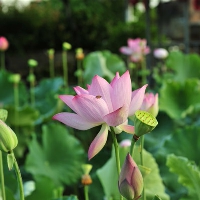Ali Baba and the Forty Thieves(p
there once lived in a town in persia two brothers, one named cassim, and the other ali baba. cassim had married a rich wife, but ali baba was poor, and made his living by cutting wood, which he brought upon three asses1 into the town to sell.
one day when he was in the forest cutting wood, he saw a troop of horsemen coming toward2 him. fearing they might be robbers3, he climbed a tree to hide. near the tree there was a steep bank formed of solid rock. when the horsemen came up ali baba counted them and found they were forty in number. they dismounted in front of the rock, and one, who seemed to be captain, said the words, "open, sesame," when instantly4 a door opened in the rock. then they all passed through, and the door closed after them.
ali baba stayed in the tree, and after awhile the door opened again, and the robbers came out. then the captain closed the door by saying, "shut, sesame," and they all rode away.
when they were out of sight ali baba came down, and, going up to the rock, said, "open, sesame." the door at once opened, and ali baba, entering, found himself in a large cave, lighted from a hole in the top, and full of all kinds of treasure--rich silks and carpets, gold and silver ware5, and great bags of money. he loaded his three asses with as many of the bags of gold as they could carry; and, after closing the door by saying, "shut, sesame," made his way home.
when he got there and told his wife of their good luck she was overjoyed, and wished to count the gold to see how rich they were. "no," said ali baba, "that will take too long. i must dig a hole and bury it at once." "you are right," said she, "but at least let us form some idea how much there is. let me measure it while you dig the hole."
but as she had no measure of her own, she ran to cassim's wife to borrow one. now cassim's wife was very inquisitive6, and wished to find out what they were going to use the measure for, so she covered the bottom of it with suet. when ali baba's wife had done with it she carried it back, but did not notice that a piece of gold had stuck to the suet. when cassim's wife saw the gold she wondered greatly--knowing ali baba to be so poor--and told her husband about it. he went to ali baba, and persuaded him to explain how he had become rich enough to have to measure his money, and when he heard the story, he made up his mind that he, too, would get some of the treasure.
so he started for the forest with a lot of mules7 the next morning. he opened the door by saying, "open, sesame," and when he went in, it closed after him. he began to pile up bags of gold near the door, but when he was ready to go he found that he had forgotten the magic words which opened it, and before he could recall8 them, the robbers returned. the moment they caught sight of him they rushed upon him with their swords and killed him, and then cut his body in four quarters and hung them up in the cave.
when night fell, and cassim had not returned, his wife was greatly alarmed and ran to ali baba. he tried to comfort her; but when morning came, and cassim did not yet appear, he set out for the cave with his three asses. when he reached there, and saw his brother's body, he was struck with horror9 at the sight, but he quickly wrapped up the pieces and carried them home on one of the asses loading the other two again with gold.
he now wished to get cassim buried without letting anyone know that he had not died a natural death. cassim's wife had a slave named morgiana, who was very quick-witted, and ali baba took her into his confidence, and got her to assist10 him. she went very early in the morning, to an old cobbler named mustapha, and bribed11 him to come and stitch12 the body together, tying a handkerchief over his eyes as she led him to and from the house, so that he would not know where he had done the work. then it was given out that cassim had died, and the funeral was held without betraying13 the secret of his death.
the customs of the country allowed a man to have more than one wife, and it was also usual when a husband died that his brother should marry his widow14. so, in order that he might enjoy his good fortune and live as a man of wealth without causing remarks to be made about his sudden rise in life, ali baba married cassim's widow, who was known to be rich, and went to live in her house.
 吃苦耐劳 2024-04-17 14:59:25
吃苦耐劳 2024-04-17 14:59:25









